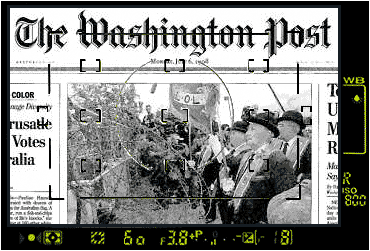The timely example (we'll get to more specific ones in a minute), is to judge Michael Jackson. Now, he has met his maker, and been judged where it matters most. However, where does he stack up in ones' own heart and mind? The easy comparison is to pit his music against the allegations and resulting settlements for his 'issues'. Yet, that does not factor in the good he did for charities, nor the odd manner in which he raised his children. The pendulum swings back and forth, and I could go on with hundreds of pluses and minuses. Thus, you get the point. Measure and celebrate just his music, and you have a hands-down showcase for any number of musical halls of fame. Add in other issues, and the matter gets decidedly cloudy.
While we don't have unions, per se, how do you qualify a "scab" in the world of photography? And, when you do, is it okay to break bread with them and play nicey-nice? What would a reader of this column surmise if they witnessed me having lunch with the greatest proponent of work-made-for-hire, or microstock? I don't know if any one individual or company fits that bill, but what would a reader think?
(Continued after the Jump)
Without knowing the topics of conversation, it would be hard to draw a thoughtful conclusion. Suppose, I was trying very hard to convince them to step away from the dark side? Sometimes, these types of conversations are incremental, or relationship building. Successes can be measured in inches, and are sometimes imperceptible to the untrained eye. The President, regardless of administration, meets with other world leaders to find places of agreement, not to argue (at least not at first) over matters of disagreement.
What, however, would be your reaction if a friend did a job you had turned down, because it was a work-made-for-hire job, or a $1k job that paid $100? And, if this same friend seemingly was echoing your anti-WMFH attitude, but you knew they had signed a WMFH contract to do that job, how would you react? Does your personal friendship survive and your business discourse with them get short circuited?
If, for example, Time Magazine had named Saddam Hussein or Osama bin Laden Person of the Year, would you cancel your subscription? Was American Photo's celebration of the work of Robert Maplethorpe (a long time ago) enough to get people to cancel their subscriptions? When news outlets get metaphorically 'spanked' by fake news (like the fake reports of George Clooney's death) does the mindset "you reap what you sow" enter into the equation?
As newspapers begin to actually rely on 'citizen journalists' for their content, over their journalistically trained professionals, will you accept the occasional assignment from them and lend your credibility to the publication, knowing that it adds to the credibility of the free 'citizen journalist' content? What if you got sent out to do the cover assignments for the publication every issue, but all the inside pages were filled with 'citizen journalism' and the frequent bad image, would you associate yourself with that?
Lots of questions here, what do you think?
Please post your comments by clicking the link below. If you've got questions, please pose them in our Photo Business Forum Flickr Group Discussion Threads.












